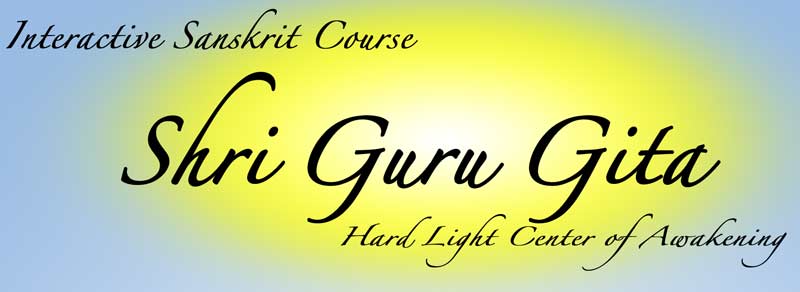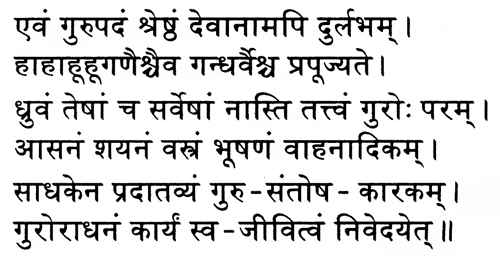
![]()

There is no truth higher than the Guru Tattva,
the Guru principle. Even gods and other
celestial beings cannot attain this highest of
states. A sadhaka should offer the Guru a seat,
a bed, clothing and other things that will please
him.

| Evam guru padam | |
| ay - vum goo - roo pu - dum | |
| Note: padam is state, footing, position. This refers to the state of the Guru | |
| shreshtham | |
| shray - sh - t(h)um | |
Note: ok... this is a challenging one to do correctly - just give it your best shot. The first 'sh' sound is palatal, and is made towards the back of the mouth. Let your tongue go back into the area where the 2 is in this picture below. The second 'sh' sound is made more in the middle the mouth cavity, and is known as a cerebral. Let your tongue go back into the area where the 3 is in this picture below. The 't' sound following this cerebral 'sh' is also made from that number 3 position of the mouth. The tongue actually touches the roof of the mouth there, as that sound is made.
|
|
| devaanaamapi | |
| day - vaa - naa - mu - pee | |
| Note: deva, as we've seen, means god. This refers to the vast panoply of the gods, who strive for the high state of the Guru - even for them it is durlabham, difficult to achieve and insurpassable. | |
| durlabham | |
| door - lu - bhum | |
| Note: the 'bh' is aspirated. Durlabham is a word we have also seen in verse 4, and means difficult, hard. Here it refers to how difficult it is for celestial beings to reach this highest of states. | |
| now glue... | |
| Evam guru padam shreshtham, devaanaamapi durlabham | |
| Haahaa huhu | |
| haa - haa hoo - hoo | |
Note: Ha Ha and Hu Hu are names of Gandharvas, one of the classifications of celestial beings. |
|
| ganaish chaiva | |
| gu - naish chai - va | |
| Note:the 'ai' is pronounced like 'aisle' or 'pie' | |
| gandharvaish cha | |
| gun - dhur -vaish chu | |
| Note: again, the 'ai' is pronounced like 'aisle' or 'pie' | |
| prapujyate | |
| pru - pooj - yu - tay | |
| now secure part two in your pronunciation... | |
| Haahaa huhu ganaish chaiva, gandharvaish cha prapujyate | |
| Dhruvam teshaam | |
| dhroo - vum tay - shaam | |
| cha sarveshaam | |
| chu sur - vay - shaam | |
| naasti tat tvam | |
| naas - tee tut tvum | |
| Note: the 'v' in tvam is soft, like a 'w'; tattvam is truth or principle. The meaning here is that the Guru Tattva, the Guru Principle, is the highest. | |
| guroh param | |
| goo- ro (h) pu - rum | |
| Note: param is highest, supreme | |
| now secure part three... | |
| Dhruvam teshaam cha sarveshaam, naasti tat tvam guroh param | |
| Aasanam shayanam vastram | |
| aa - su - num shu - yu - num vu - strum | |
| Note: asana means seat or posture (as in hatha yoga asanas). So the meaning here is to offer the Guru as seat; vastram is clothing, shayanam is bed. | |
| bhushanam | |
| bhoo - shu - num | |
| Note: ornaments | |
| vaahanaa dikam | |
| vaa - hu - naa dee - kum | |
| Note: vaahanaa, vehicle | |
| now part four... | |
| Aasanam shayanam vastram, bhushanam vaahanaa dikam | |
| Saadhakena | |
| saa - dhu - kay - nu | |
| Note: a sadhaka is a spiritual seeker, one doing sadhana | |
| pradaatavyam | |
| pru - daa - tu - vyum | |
| guru santosha | |
| goo - roo sun - to - shu | |
| kaarakam | |
| kaa - ru - kum | |
| now part five... | |
| Saadhakena pradaatavyam, guru santoshakaarakam | |
| Guror aaraadhanam | |
| goo - ror aa - raa - dhu - num | |
| Note: aaraadhanam means homage, worship, devotion. We also saw this word in verse 13. | |
| kaaryam | |
| kaar - yum | |
| sva jivitvam | |
| svu - ji - vee - twum | |
| Note: the first 'i' in jivi is short, and the second is long. Both 'v' sounds are soft. Sva means one's own, and jiva means life (for instance, jivan-mukti means realized while alive, while living). The meaning here is that not only should all these things be offered to the Guru, but also one's very life should be offered. |
|
| nivedayet | |
| ni - vay - du - yayt | |
| and finally part six... | |
| Guror aaraadhanam kaaryam, sva jivitvamnivedayet | |
| Now repeat the entire verse all together: | |
| Evam guru padam shreshtham, devaanaamapi durlabham; Haahaa huhu ganaish chaiva, gandharvaish cha prapujyate. Dhruvam teshaam cha sarveshaam, naasti tat tvam guroh param; Aasanam shayanam vastram, bhushanam vaahanaa dikam. Saadhakena pradaatavyam, guru santoshakaarakam; Guror aaraadhanam kaaryam, sva jivitvamnivedayet. | |
| and know the keywords: | |
| Evam guru padam shreshtham, devaanaamapi durlabham; Haahaa huhu ganaish chaiva, gandharvaish cha prapujyate. Dhruvam teshaam cha sarveshaam, naasti tat tvam guroh param; Aasanam shayanam vastram bhushanam vaahanaa dikam. Saadhakena pradaatavyam, guru santoshakaarakam; Guror aaraadhanam kaaryam, sva jivitvamnivedayet. | |
| There is no truth higher than the Guru Tattva, the Guru principle. Even gods and other celestial beings cannot attain this highest of states. A sadhaka should offer the Guru a seat, a bed, clothing and other things that will please him. | |